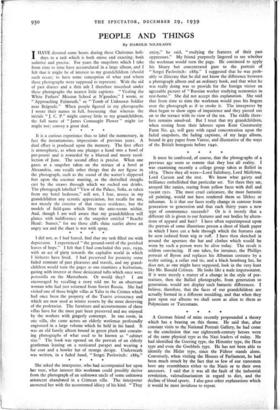She asked the interpreter, who had accompanied her upon her
tour, what interest this workman could possibly derive from the photograph of an unknown uncle of some unknown aristocrat abandoned in a Crimean villa. The interpreter answered her with the accustomed idiocy of his kind. " They enjoy," he said, " studying the features of their past oppressors." My friend purposely lingered to see whether the workman would turn the page. He continued to apply his bleary but concentrated gaze to the portrait of " Sergei Pavlovitch: 1889." I suggested that he was prob- ably so illiterate that he did not know the difference between a photograph album and an ordinary book, and that what he was really doing was to provide for the foreign visitor an agreeable picture of " Russian worker studying economics in rest-home." She did not accept this explanation. She said that from time to time the workman would pass his fingers over the photograph as if to stroke it. The interpreter by then began to show signs of impatience and they passed out on to the terrace with its view of the sea. The riddle there- fore remains unsolved. But I trust that my grandchildren, when resting from their labours upon Kent Community Farm No. 42, will gaze with equal concentration upon the faded snapshots, the fading captions, of my large album, bound in gay paper from Varese, and illustrative of the ways of the British bourgeois before 1940.






























 Previous page
Previous page